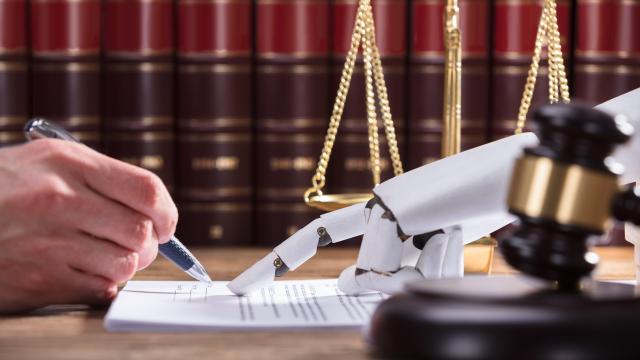If you’ve been fantasizing about the day when artificial intelligence could get you out of paying traffic tickets, you’ll just have to keep dreaming. DoNotPay has backed out of its plans to use an AI-powered “robot lawyer” to council a defendant through a courtroom hearing in real time. The reason why? Well, apparently the law got in the way of the robot’s lawyering.
The company’s founder and CEO, Joshua Browder, first announced the news in a Wednesday tweet. “After receiving threats from State Bar prosecutors, it seems likely they will put me in jail for 6 months if I follow through with bringing a robot lawyer into a physical courtroom,” he wrote. In a phone call with Gizmodo, Browder reiterated his view that, were he to follow-through on his initial promises, he’d likely end up with a prison sentence.
DoNotPay initially announced that it had developed an AI-legal advice tool, using OpenAI’s ChatGPT technology, and was planning to surreptitiously test the tool in a real, live court case, earlier this month. But then, the backlash from lawyers and Bar associations began, Browder told Gizmodo.
DoNotPay didn’t publicly reveal the state where the test traffic violation case was set to be heard. However, the CEO explained that enough Bar associations contacted the company and threatened charges, that the risk of retaliation became too great. In fact, the bevy of angry lawyers’ associations inadvertently included the state where Browder we planning to bring his AI creation to court. “The State Bar in question doesn’t know that they were the relevant case,” he added. But just knowing that State’s Bar was paying attention was enough to spook the DoNotPay founder.
“They were threatening to charge us with unauthorised practice of law,” Browder said. He further speculated that other charges like interfering with judicial practice could’ve been on the docket. Through extensive discussions with his company’s actual, human legal advisors, Browder said it became clear that “according to my counsel, I could go to jail for six months for helping one person with a $US200 ($278) speeding ticket.” Unauthorised practice of law charges carry widely varying prison sentences from state to state, but range up to two years for first time offenders, according to a 2011 analysis.
To Browder, the risk of prison wasn’t worth it for what he has now decided is/was a distraction from DoNotPay’s main goal of consumer rights and advocacy. Now, “we’ve basically shifted away from this legal direction and we’re doing all consumer rights,” Browder said. Getting consumers their money back from places like greedy utility companies and insurers is DoNotPay’s “bread and butter,” he added.
Also, Browder is British and, as a non-U.S. citizen, he said, “I don’t need that on my record… I don’t want this drama.”
In a previous conversation with Gizmodo, Browder touted lofty goals like expanding “access to justice” for people who couldn’t otherwise afford legal assistance. Now, he is thinking smaller. “We’re staying in our lane, to use a traffic ticket metaphor.”
Browder made it clear in both conversations with Gizmodo that he was aware of the legal risks and potential violations inherent in the aborted courtroom scheme. But he was confident that it would be small potatoes to the legal system.
“I didn’t really think that [the courts and lawyers] would be so angered because I thought it was just a traffic ticket case, and it’s not the Supreme Court,” Browder said. Which is an odd choice of words considering that the same guy once tweeted that his company would pay $US1 ($1) million to anyone willing to use DoNotPay’s AI legal advisor in front of the U.S. Supreme Court, but I digress.
“I also underestimated how much lawyers would spend their time and resources trying to stop this,” Browder added. Yet you’d think it would be obvious that lawyers are, by definition, litigious.
On top of abandoning its plans for AI-assisting an in-person court case, DoNotPay will also not move forward with a similar virtual case, which had been set to happen via Zoom trial.
Further, the company has removed all of its legal advice templates and document generators from its website, according to Browder. These templates weren’t AI-powered, but the CEO decided that they too posed a distraction from his company’s main purpose.
“I don’t think robots should be drafting defamation letters,” he said. “I think it’s just really good for consumer rights.”
Moving forward Browder said DoNotPay will continue developing AI tools to help its users navigate phone calls and other interactions with corporate bureaucracy. Currently, the site still offers templates and non-AI, automated tool like chatbots to help people work through daily frustrations like Comcast tech support.
“This courtroom stuff was never a product to begin with. It was just an advocacy project,” Browder emphasised. “Lawyers won this round, but we’re coming back.” Even if DoNotPay survives this PR rollercoaster though, the “robot lawyer” certainly didn’t.
